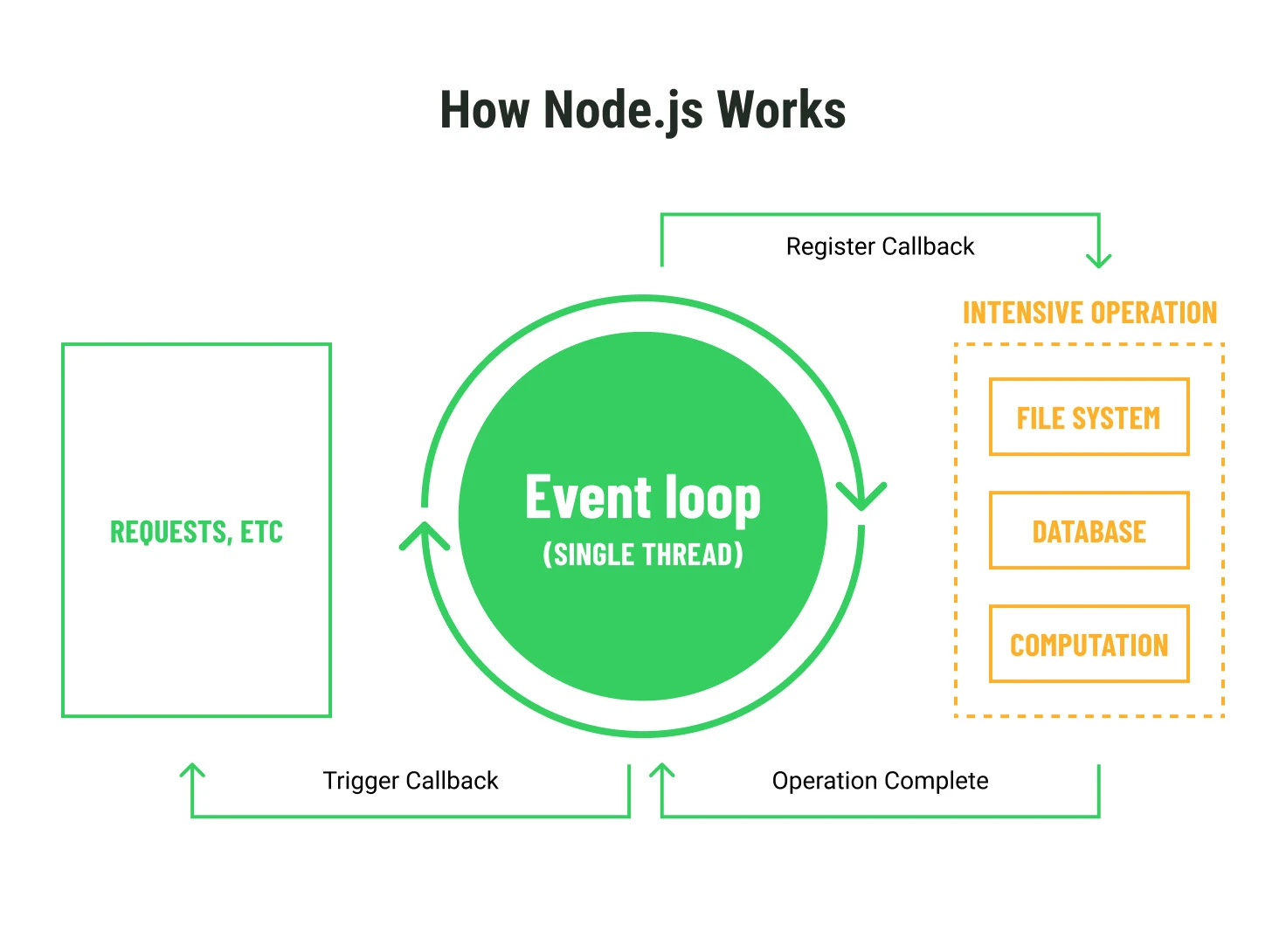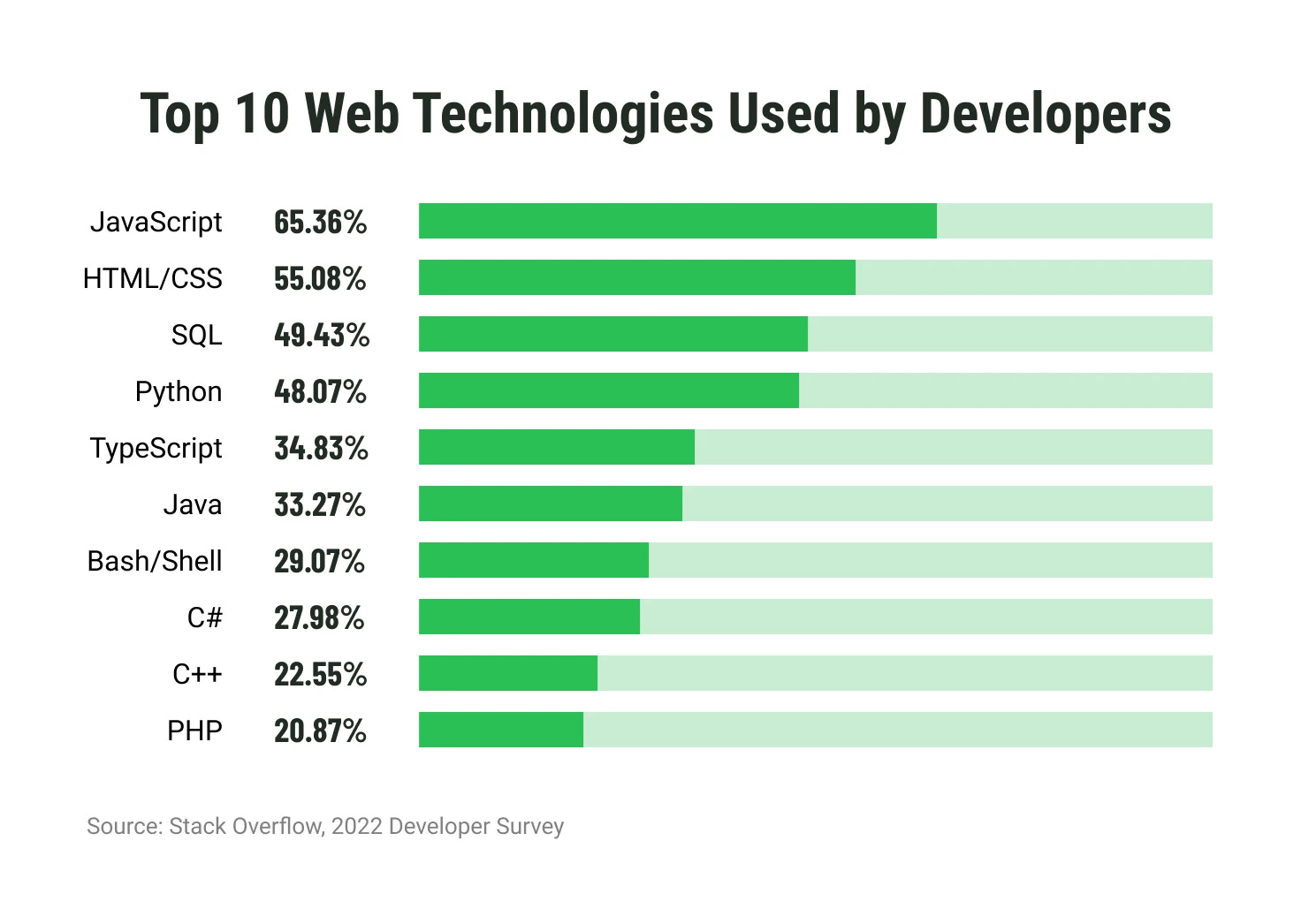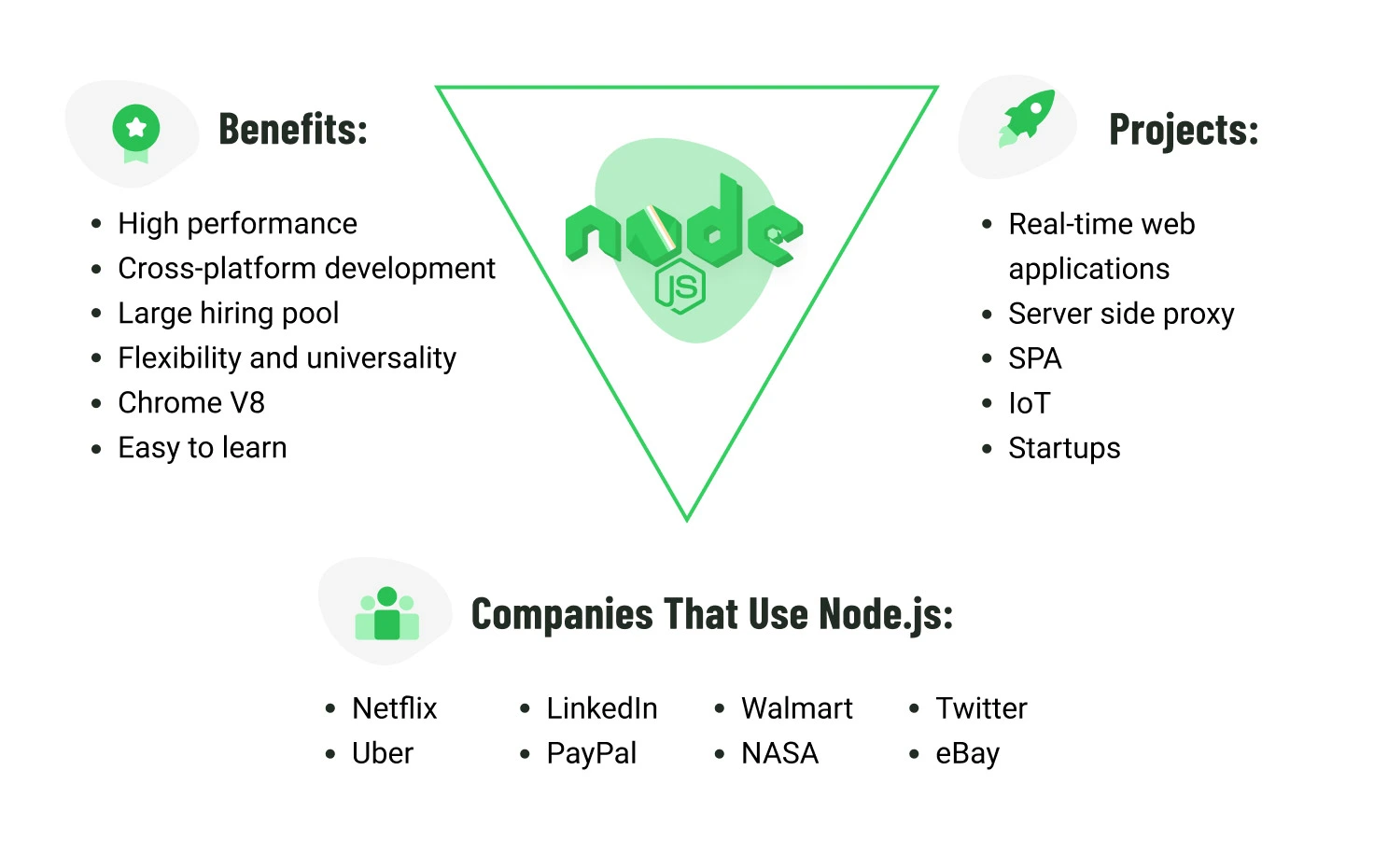Table of contents
- What Is Node.js, and How Does it Work?
- Why Node.js: Reasons to Choose It for Your Projects
- Large hiring pool
- Concurrent programming
- Easy to scale
- Chrome V8
- Lesser loading time
- Universality and flexibility
- Best Use Cases for Node.js
Real-time web applications- IoT
- SPA
- Startups
- Node.js Trends in 2022 and Beyond
- Wrapping Up
Regarding backend development, companies are looking for the most reliable tools. And for a good reason: whereas the frontend part is only the tip of the iceberg, the backend of any project is a complex system that allows the application to search efficiently, promptly give information to the user, ensure secure data storage, and, if necessary, work with other external systems.
And for all processes to work smoothly, like a Swiss watch, you should thoroughly approach the backend language choice. Python or Java, C# or PHP, Go or Kotlin 一 there are plenty of technologies to choose from. In this article, we will talk about Node.js: what web projects you can create with it, and its advantages compared to other programming tools and languages.
What Is Node.js, and How Does it Work?
Node.js is not an independent programming language but an open-source JavaScript runtime environment that allows developers to run JavaScript code on the server.
Powered by the V8 JS engine developed by Google and used in Google Chrome, Node.js allows writing server-side code for web applications, dynamic web pages, and command-line applications. With an event-driven and non-blocking I/O model at the core, Node.js is a very efficient technology.

This platform has revolutionized server-side development and contributed to the performance of client applications, as significant efforts were invested in developing the V8 engine. In addition, it plays a significant role in expanding the entire JavaScript ecosystem and improving modern JS frameworks such as Angular, React, or Vue.
Why Node.js: Reasons to Choose It for Your Projects
Stack Overflow's developer survey for 2022 shows that it's currently the most used web technology by developers. It's also the tool with the fastest-growing popularity over the last six years.

And here are the main reasons behind its popularity.
Large hiring pool
First, Node.js is easy to learn, especially if web developers have experience with JS. If they know the syntax, all they need to know is the commonly used APIs. In addition, it’s an open-source framework maintained and improved by a large developer community. Developers can get support from experienced developers from all over the world to solve any problem they may have while learning or using it. As a result, hiring and onboarding take much less time, allowing you to deploy your project team more quickly.
Concurrent programming
JS + Node.js offers primitives to synchronize concurrent programming. Many advanced backend development technologies don’t have this feature.
Easy to scale
Node.js is a powerful tool when it comes to balancing performance and scaling. The platform provides access to a huge number of users at the same time. Instead of creating new threads for each new connection in the RAM of a server, Node.js connects everything to one thread. It follows that up to a million connections are possible in one instance. If the single-threaded paradigm limits you, version 12 of Node.js provides us with working threads as a stable feature, which has been introduced as experimental in V10.
Chrome V8
Node.js is powered by the JavaScript engine V8 developed by Google. The V8 is an open-source JavaScript engine available under the BSD License. It is used in Chromium-based browsers. This means Node.js consists of the best practices of thousands of engineers. The engine is written in C++ and has open-source code and advanced libraries.
Lesser loading time
Node.js includes a caching module that aids in reducing overall loading time. Developers can now run the code without any hassle. Furthermore, a caching module allows the web app to receive a request and transfer it to in-app memory quickly. As a result, the user can access results from websites in just a few microseconds.
Universality and flexibility
The tool allows you to develop various web applications: from corporate management solutions to web stores, from streaming platforms to cross-platform apps and enterprise-level computing systems. If you want to build a product using Node.js, here are the top cases where this technology will be the best tool.
Best Use Cases for Node.js
Real-time web applications
Node.js is truly useful for developing social media apps, streaming services, collaboration tools, interactive business websites, instant messengers, and more.
With an event-driven framework and WebSockets, Node.js can easily process high-traffic real-time streams and support high-level streaming with read or write data streams. As a result, users do not experience delays in data exchange or updates.
IoT
Node.js is becoming a more common technology for creating ecosystems of connected devices.
IoT devices generate a large number of requests that require quick processing. Node.js handles these requests efficiently with no downtime. Also, Node.js servers can store large amounts of data generated by IoT devices. And last but not least, since Node.js is a memory-friendly framework, it can be easily integrated with single board controllers to create digital devices for the IoT ecosystem.
SPA
SPA is a single page in the browser with dynamically changing body content. Such apps don’t require the whole webpage to be uploaded to show the data to users; they are way faster than regular websites and can significantly improve the user experience in places with slow internet connections.
Node.js is well suited for creating SPAs because it can process I/O intensive workloads and works great with asynchronous requests. Moreover, SPAs are built with JavaScript, which is the primary programming language for the Node.js platform.
Startups
Node.js appears to be the most obvious choice for startups. Easy and reusable code, no switching between back-end and front-end, ability to handle multiple requests, faster time-to-market due to prompt code execution, better scalability, numerous libraries, reusable templates, top-notch prototyping capabilities 一 all these have brought Node.js to the attention of the startup community.
Moreover, a vast talent pool of Node.js developers makes it easier to find contractors when outsourcing your Node.js project.
Its high efficiency is also confirmed by a tremendous number of famous projects written with this technology: Mozilla, Paypal, eBay, Shutterstock, Walmart, etc. As we can see, all these companies develop in entirely different industries and offer a product with unique features and goals targeted for different audiences. Thus, we can conclude that Node.js plays an important role in the technology stack.
Node.js Trends in 2022 and Beyond

JavaScript is becoming the language for everything. Server, browser, mobile apps, desktop apps, IoT — JavaScript has a comparative advantage in different projects. And with current adoption by over 20 million websites, Node.js is sure to remain popular in the near future and beyond.
Of course, like any programming tool, Node.js has its drawbacks 一 for example, its library support system is not as strong and well-equipped as those of other programming languages; in addition, in Node.js, there are frequent API changes. However, this sounds like a challenge to a large number of specialists who are constantly working on the technology.
Wrapping Up
To sum up, Node.js definitely plays a stellar role in developing the backend for scalable & high-performing web applications. Its wide adoption is a great proof of that.
To use the full potential, you need a lot of experience in programming, as well as knowledge of all the intricacies of both front-end and back-end development. By hiring the Emerline Node.js team, you receive experts who have been working with Node.js since its creation. They studied all the subtleties of this technology and have vast expertise in delivering Node.js projects for various industries.
Book a free consultation with experts, and we guarantee the delivery of a product that will help your business take a significant place in the market.
Updated on Mar 17, 2024





